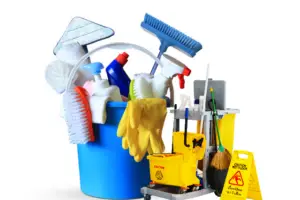Do you enjoy cleaning as a chore and wants to turn your hobby into a lucrative business? This article might just be for you as it contains information on how to start a Cleaning Company in South Africa.

Introduction
The more people get busy with their daily activities, the less time they spend on cleaning. For such individuals, they will rather outsource their cleaning activities to trusted cleaning companies. Starting a cleaning company is not so expensive. According to BFS [3], you can spend anywhere from R30,000 to get a residential cleaning business operation off the ground, and closer to R300,000 for a more commercial operation if you are spending on industrial cleaning equipment. Hence, if you’re looking for a less capital intensive business to venture into, starting a cleaning business is a perfect option.
A cleaning business can be extremely profitable, rewarding and flexible. Starting a cleaning company in South Africa [4], like any business venture, requires careful planning, research, and execution.
If you are considering starting a cleaning company in South Africa, this article contains information on how you can do just that.
Steps to start a cleaning company in South Africa
Without further Ado, these are steps to start a cleaning company in South Africa:
1. Carryout Market Research:
The main reason a lot of startups collapse is due to a lack of carrying out market surveys. Carrying out market surveys is the first step to starting a business, regardless of the type. Conducting thorough market research enables you to understand the demand for cleaning services in your target area. Identify your potential competitors, their services, and pricing. When you identify all these, it will guide you to make informed decision on:
Strategies to apply to stand out from your Competitor
Pricing
Equipments required
Location
Target audience
Type of cleaning company (niche).
The decision on whether or not to niche down depends on the type of cleaning business you want to venture into. You may choose to start a general cleaning company or not. Whatever it may be, it is important to bear in mind that businesses that focus on a particular niche tend to get more pay than others.
2. Choose Your Company /Business Name
Choosing the right business name is a crucial step in starting a company as it sets the tone for your brand identity and can impact your business’s success. After establishing the type of cleaning company you want (commercial or consumer cleaning service providing company), choose a name for your business. Ensure that your chosen name is unique and not already in use by another business in your industry or locality. Check with the Companies and Intellectual Property Commission (CIPC) or a similar authority in South Africa to verify name availability.
Also, avoid overly complex or lengthy names that may be hard for customers to recall.
3. Create a Business Plan
Create a detailed business plan outlining your company’s goals, target market, services offered, pricing strategy, and financial projections. Your business plan should contain facts and figures, starting from your executive summary, financial forecasts, service rates, funding plans, and marketing strategy. This plan will serve as a roadmap for your business.
Keep your business plan digital so you can easily email potential investors and update your figures.
4. Legal Requirements/Essential Registrations

Having chosen your company’s name, it is paramount to register it with recognized bodies and get insurance. Registering it with the CIPC is the first step to start a business. For as little as R125 you can register your cleaning company as a legal entity. You can choose between a sole proprietorship, partnership, or a company structure. Obtain all necessary permits and licenses, including a business license and tax registration.
Bear in mind that you must register with NCCA [2] (the National Contract Cleaners Association) as they are the custodian of standards in the South African cleaning industry.
Invest in liability insurance to protect your business in case of accidents or damage to clients’ property. This is crucial for building trust with potential clients.
5. Branding and Marketing

Unique branding is one of the things that makes a lot of companies stand out from their competitors. Hence, in starting a cleaning company, branding isn’t left out. Develop a strong brand identity, including a memorable logo and a professional website, when necessary. Use online and offline marketing strategies to promote your cleaning services. Consider using social media, local advertising, and partnerships with local businesses.
6. Equipment and Supplies

Although the type of equipment needed is dependent on the type of cleaning service, investing in high-quality cleaning equipment and supplies is important. You can start with basic cleaning equipment [1] till you scale in business.
When this is sorted, ensure your staff is trained to use these tools effectively and safely. Consider eco-friendly cleaning products to attract environmentally-conscious clients.
7. Staffing/Training
A lot of times, cleaning companies were started by the founders who cleaned alone with little or no help. You may also start by handling the cleaning jobs alone. Whilst there may be no minimum entry requirements or certification, it is important to consider completing a training course before you go into someone’s house or office space to offer your cleaning services, especially if you have no experience. A course will teach you about the appropriate equipment and products to use, as well as show you how to become a professional cleaner.
Overtime, as the company grows, there will be a need to hire and train reliable and trustworthy cleaning staff. Conduct background checks and provide proper training on cleaning techniques and customer service. You wouldn’t want your company to be accused of theft after rendering a service.
8. Contracts and Agreements
Develop clear and comprehensive contracts for your clients. Specify services, pricing, terms, and conditions. Contracts are essential for both legal protection and setting clear expectations.
9. Accounting and Finances
Set up a robust accounting system to track expenses, income, and profits. Consider hiring an accountant or using accounting software to manage your finances effectively.
10. Provide Exceptional Customer Service
Focus on providing exceptional customer service. Happy clients are more likely to refer to your services and become repeat customers. The growth of a cleaning company is mostly achieved true referrals.
11. Build Industry Network
Attend industry events, join cleaning associations, and network with other business owners. Building a professional network can lead to valuable partnerships and referrals. Moreso, it helps your company to Stay up to date with all relevant labor laws, tax regulations, and industry standards in South Africa.
Conclusion
Starting a cleaning company is not such a difficult process especially when you have the right information. Besides the steps identified in this article, remember that starting a cleaning company requires dedication, hard work, and patience. It may take time to build a solid client base and establish a strong reputation. By following these steps and continuously adapting to market changes, you will avoid mistakes and increase your chances of success in the cleaning industry in South Africa.
References
[1] Boyton, William. “Most Essential Cleaning Business Equipment Checklist.” TrustedCleaner, 3 Sept. 2022, https://www.trustedcleaner.com.au/cleaning-business-equipment/.
[2] “Cleaning Industry.” NCCA, 28 Apr. 2022, https://ncca.co.za/.
[3] “How Do You Start a Cleaning Business in South Africa?” Businessesforsale.Co.Za, https://www.businessesforsale.co.za/southafrican/guides/start-cleaning-business.
[4] Kinuthia, Peter. “How to Start a Cleaning Company in South Africa as of 2023.” Briefly, 24 Mar. 2023, https://briefly.co.za/106850-how-start-a-cleaning-company-south-africa.html.
Don’t miss out on current updates, kindly like us on Facebook & follow us on Follow @EAfinder OR leave a comment below for further inquiries





